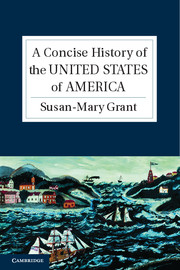Book contents
- Frontmatter
- Contents
- Figures
- Tables
- Acknowledgments
- Introduction
- 1 New Found Land
- 2 A City on a Hill
- 3 The Cause of All Mankind
- 4 Self-Evident Truths
- 5 The Last, Best Hope of Earth
- 6 Westward the Course of Empire
- 7 A Promised Land
- 8 The Soldier's Faith
- 9 Beyond the Last Frontier
- 10 A Land in Transition
- 11 Armies of the Night
- Notes
- Guide to Further Reading
- Biographies
- Index
3 - The Cause of All Mankind
From Colonies to Common Sense
Published online by Cambridge University Press: 05 June 2012
- Frontmatter
- Contents
- Figures
- Tables
- Acknowledgments
- Introduction
- 1 New Found Land
- 2 A City on a Hill
- 3 The Cause of All Mankind
- 4 Self-Evident Truths
- 5 The Last, Best Hope of Earth
- 6 Westward the Course of Empire
- 7 A Promised Land
- 8 The Soldier's Faith
- 9 Beyond the Last Frontier
- 10 A Land in Transition
- 11 Armies of the Night
- Notes
- Guide to Further Reading
- Biographies
- Index
Summary
The cause of America is in great measure the cause of all mankind.
(Thomas Paine, Common Sense, 1776)Conflict, to a great extent, defined the colonial experience, and conflict would eventually destroy the colonial project and create the new nation that was America. Open warfare with the Algonquian nations helped the white settlers assert a separate identity from the aboriginal populations and established racial distinctions that would eventually divide white society from the African peoples brought to the New World. This was not racism as we would utilize the term today, but the assumption of ideas about race that would, in time, harden into a set of fixed racial and ethnic parameters themselves formed, at least in part, through warfare.
Warfare assured English settlers of their essential Englishness in an environment that called that identity into question and challenged it not just via English contact with the Amerindians, but by what they knew of other colonial efforts. The French in New France were more determined than the English to acquire native converts to the (in their case, Catholic) faith as well as to absorb them, absent their aboriginal culture, of course, into French norms. They frequently found that their efforts backfired. As one contemporary official, Jean Bochart de Champigny, observed, “[I]t happens more commonly that a Frenchman becomes savage than a savage becomes a Frenchman.” From an English perspective, this was a moot point. Before too long, they would be battling both French and native. For the English, it was through violence that they asserted their validity as freeborn Englishmen and upheld the values attendant on that status. Ultimately violence would force them toward a new identity, derived from, but set apart from, that provided by their European origins. America as a political and cultural nation, a separate nation-state, may have originated in “Albion's Seed,” but Albion's was the not the sole seed planted in the New World environment, and when all had germinated, a very different plant appeared.
- Type
- Chapter
- Information
- A Concise History of the United States of America , pp. 71 - 104Publisher: Cambridge University PressPrint publication year: 2012

